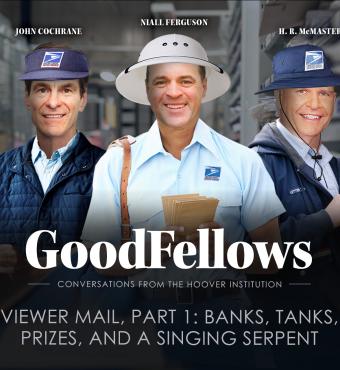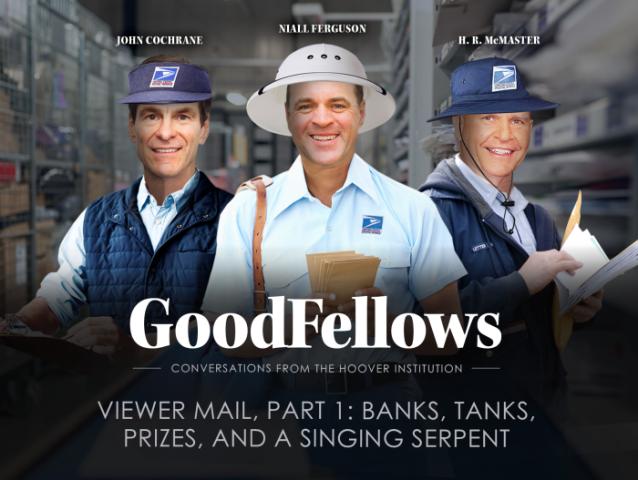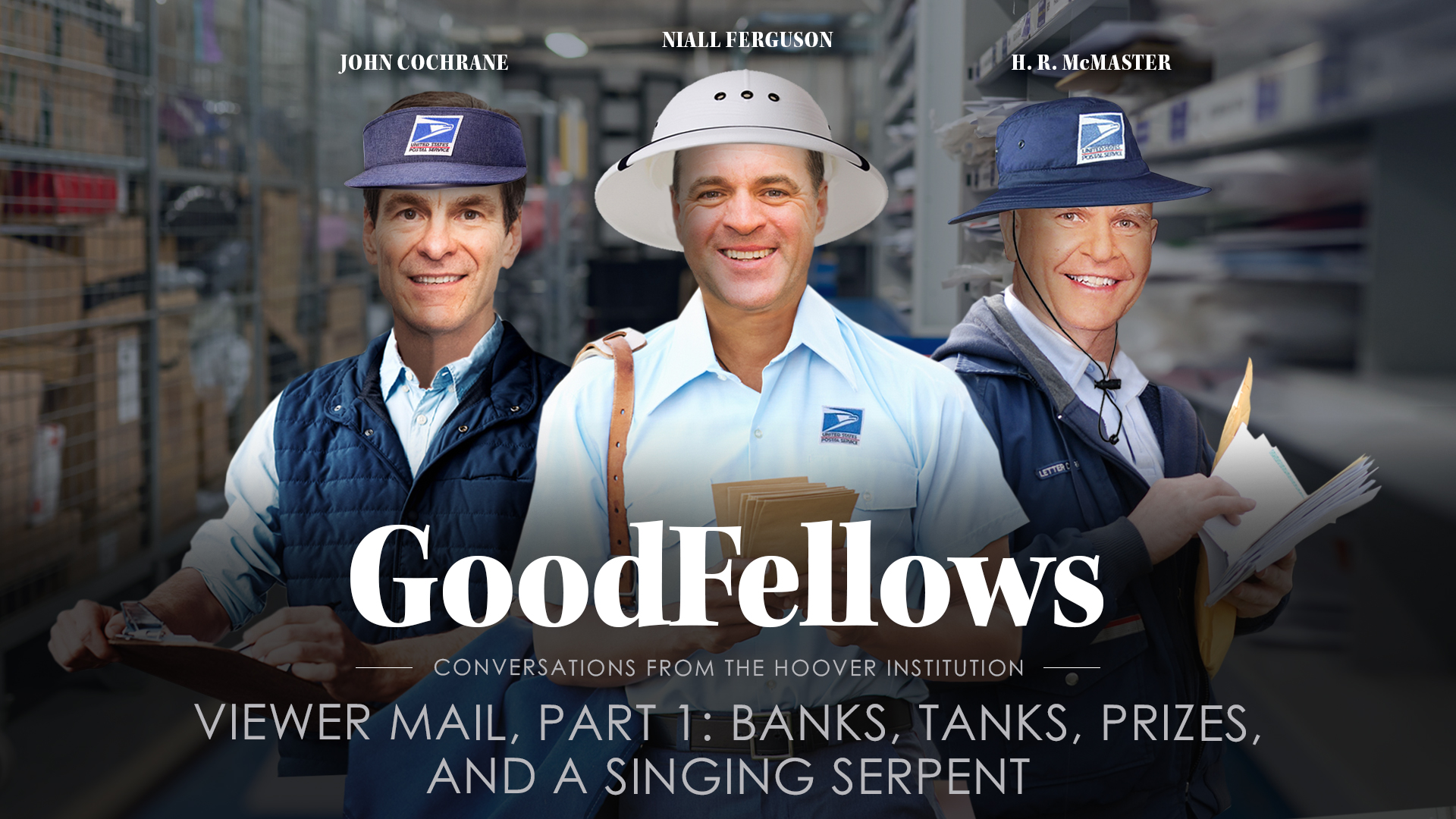The first of two episodes devoted solely to questions from the audience—viewers and listeners from nearly three dozen nations spanning six continents—who ask Hoover senior fellows Niall Ferguson, H. R. McMaster, and John Cochrane whether a protracted war favors Russia or Ukraine; what is China’s geopolitical interest in the conflict; what are financial risks associated with Silicon Valley Bank’s travails; plus each GoodFellow’s first act if they were elected president of the United States.
>> Bill Whalen: It's Thursday, March 23, 2023, and welcome back to GoodFellows, a Hoover Institution broadcast examining social, economic, political, and geopolitical concerns. I'm Bill Whelan. I'm a Hoover distinguished policy fellow. I'll be your moderator today. I'm glad to report that I'm joined, as usual, by the three stars of our show, our GoodFellows.
That would include the historian Neil Ferguson, the geostrategist, lieutenant general HR McMaster, and the economist John Cochrane. If you notice, I did this out of order because we wanna focus on John Cochrane for a minute. Something very special happened today at the Hoover Institution. Our friend John Cochrane was named a winner of the 2023 Bradley Prize in honor of, and I quote, those who quote, restore, strengthen, and protect the principles and institutions of American exceptionalism.
Past honorees, including his fellow Hoover economist, John Taylor, GoodFellows fan favorite Victor Davis Hanson, and a promising young academic name, Ayan Hersey Alley. John, congratulations. What esteemed company to be in.
>> John Cochrane: It certainly is esteemed company. I feel unworthy, but it certainly, it's lovely to know someone out there is listening to my little scribblings, and it inspires me to do even better and to slowly become worthy of this over time.
>> Bill Whalen: H.R, anything you want to add?
>> H.R. McMaster: Hey, congratulations, John. I mean, super well deserved. And, I mean, your scholarship is impeccable, but it's also accessible. Even washed up generals can begin to learn something about economics, man. So congratulations, really. I mean, it's great for you and obviously for the Hoover institution.
>> Niall Ferguson: And, John, I hope it's just the first of many prizes that you'll win for the fiscal theory of the price level, which is a seminal book. And with every passing day, I think we're gonna see just how profound your insight is into our economic predicament. So may this be the first of many prizes.
>> Bill Whalen: Neil, it's a special show because of John's great honor, and it's also a special show because we're doing something a little different today. A few days ago, we put out a video in which I asked you, our viewers, to send in questions to Neil and HR and John, and you crushed it.
You sent in hundreds of questions. The reach of GoodFellows never ceases to amaze. We received more questions from people living abroad than we did here in the United States, 31 countries in all encompassing six continents. We're waiting for that elusive question from Antarctica. So if you're out there, please send it in.
And gentlemen, if you're ready, start your engines. Here we go. Our first question comes from Doug in Vermont. He writes, is time on the side of the Russians or the Ukrainians? HR, why don't you take that?
>> H.R. McMaster: I mean, that is the question. And as you know, our director Caroleeza Rice and former secretary of Defense Bob Gates wrote an essay in saying time is not on Ukraine's side in an effort, really, I think, to stop this incremental approach to providing support to the Ukrainians.
So I guess my answer would be it depends, right? It depends on if the Ukrainians can succeed in mounting a sustained counter offensive in Ukraine in the near term faster than Russia can generate more combat power. I think that's quite likely, actually in the near term. And then in the long-term it is whether or not really the United States, Europe, we saw the IMF act here.
It can help Ukraine jumpstart the regeneration of economic activity and have a financial plan for the long-term viability of Ukraine. Remember, Russia has been trying to choke Ukraine out here essentially, and they compare that to the long-term effects on the Russian economy of sanctions. So I guess I don't know, but I think those are the factors to look at in the short and the long-term.
I'm optimistic, though, that Ukraine can win if we stop incremental support and if we continue the maintenance on the sanctions against Russian entities, especially those connected to Russia's ability to maintain its war making machine.
>> Bill Whalen: Neil, what say you?
>> Niall Ferguson: Well, a week ago, I was very privileged to be a participant in a major conference on this subject organized by the Hoover military history working group, which is led by our good friend Victor Davis Hanson.
And I was very struck in the course of a day of deliberations by the sober mood that prevailed. I would say that the most powerful contributions from Steve Kotkin, our colleague here at Hoover, and Michael Kaufman, emphasized the extent to which any struggle between a large power. And Russia is large, demographically large economically and large, of course, territorially relative to Ukraine.
Time is on the side of the larger power, and nothing that has happened in recent months has, I think, greatly improved Ukraine's chances. We now know much more about Ukrainian casualties than we did just a few weeks ago. It's now clear that Ukraine is pretty much out of the western trade officers and men who fought so heroically in the first phase of this war.
It's having to bring in soviet era officers that is gonna impede its war fighting capability. It is clear that China is now backing Russia right up to the edge of triggering sanctions. There's a lot of dual use material already going into the rush war machine. And Xi Jinping's visit to Moscow turned out to be at least a verbal sign of support, if not a material sign of support for Putin.
So I'm afraid, I think the outlook is bleak. We must hope that Ukraine's impending offensive proves me wrong and that once again Ukraine can surprise us and drive Russia back closer to the Russian border. But it's hard to believe that time can be on the side of Ukraine, especially given, I'm afraid, western democracy's somewhat checkered track record when it comes to sustained commitment in conflicts of this sort.
Sorry to sound like the Debbie Downer on this one, but it was not just my feeling, but the impression, I think, of most people at last Friday's conference, that the time is now increasingly on Russia's side. I hate to say that.
>> H.R. McMaster: Can I interject something just quickly?
I'm reminded of a story of when Grant, in his first battle, right? He's riding toward the front and he sees casualties coming back and it looks really bleak. And he gets to the front and then he sees Sherman stabilizing the front and realizes that actually the enemy is in much greater disarray.
And he writes in his memoir that the distant rear of an army is not the best place from which to judge what is going on in front. And he didn't get a sense for really the moral dimension of the battle until he was actually in it. I think that that's what's on the Ukrainian side.
I think it's hard to quantify Ukrainian will. And even though demographically Russia looks big, how many military age of the population that can be recruited are really willing to serve? And I think that's a little bit of an equalizer between Ukraine and Russia. But Neil's right to point out, you have to look at the casualties and the will and the capacity on both sides and the skill level as well.
So I just wanna interject that because I'm not as pessimistic as Neil here, because I believe the Russians are getting their asses kicked at a high cost to the Ukrainians around Bakhmut. But the Russians are trading thousands of casualties for hundreds of meters, okay? But I just wanted to respond to that, Neil, to play my role as the more optimistic of Of the good fellow before it goes to John.
>> Bill Whalen: Jump in here, John.
>> John Cochrane: Well, I think you guys are framing it too narrowly. The question really is, is time on the side of the US, our Western allies and our remaining friends. Or is time on the side of the emerging and forming alliance of Russia, China, Iran, and the people standing around the edges trying to decide who's gonna come out on top?
India, South Africa, the rest of Africa, and so forth. Now, I'm a little bit of a hawk on this war because it strikes me this is our war, not just Ukraine's war. If we were to win it quickly, before that alliance can really deepen, things would be much easier than letting it sit and fester and do just enough to stop them from losing, but not let them win.
Cuz they had alliance is gaining strength politically and militarily. As far as the long run, I just wanna say, so I'm in Tokyo right now, which didn't look so good in August of 1945, and looks pretty darn good now. Countries can rebuild from rubble given the right circumstances.
>> Bill Whalen: Thank you, question from Richard in London, he writes, with President Xi's visit to Moscow this week, what is China's geopolitical strategy towards Russia? With America and its allies pouring in so much of its military and economic resources in the Ukraine war, does China see it in its geopolitical interest for the war to continue as long as possible, Neil?
>> Niall Ferguson: This is a very difficult question to answer because we know what was said for public consumption, but not what was said behind closed doors. I dont think this is now a friendship without limits as it was prior to the war, at least in the language of their last pre-war meeting.
It's possible that China is pressing Russia to consider some kind of peace negotiation, although I don't think any kinda negotiations conceivable until after the next Ukrainian offensive. My own somewhat cynical view is that this war is serving China's interests very well, and why would they want it to stop?
It's absorbing American energies, it's absorbing Western resources, it's distracting attention from Asian theaters of great interest to China, not least Taiwan. So I regard the Chinese peace proposal as something that is essentially for show and not sincerely intended to end the conflict. I think the key point is we can't afford for Ukraine to lose and China can't afford for Russia to lose, and that is why this war is gonna drag on.
I think one reason that Xi went to Moscow was more to make sure that Russia doesn't fold. And that, I think, is the significance of the increased Chinese supply of dual use equipment rather than to try to press Putin to settle, which some people hoped Xi Jinping might be intending to do.
So I think you're seeing here a really important globalization of the Ukrainian war. Not only was Xi in Moscow, the Japanese prime minister was in Kyiv making a surprise visit with obvious symbolic significance. This is no longer a regional East European conflict, this is now part of a global struggle, which I've been calling Cold War II until everybody sick of hearing me say it.
But that, I think, is the real significance of Xi's visit.
>> Bill Whalen: HR?
>> H.R. McMaster: Hey, I think China's got some real problems because I think doubling down on the relationship with Putin, I think that's really gonna suffer even greater reputational damage. So here you have the leader of a country who's presiding over genocide.
Meaning the leader of a country who's just been indicted by the International Criminal Court for kidnapping tens of thousands of children, I mean, that doesn't seem like a good look to me. And I think what's shifting against China is people are fed up with China's narrative that you can't go meet with any leaders in Taiwan while he goes and meets with Putin, who's just been indicted by the International Criminal Court.
That doesn't kind of sound persuasive anymore, and I think that Europe has shifted in its attitude toward China, in large measure because of the wake up call of the Ukraine war. And especially, the degree to which it exposes the, hey, it's a really, really bad idea to give an authoritarian, hostile regime coercive power over your economy.
So I think what you're gonna see is a continued selective but accelerating decoupling from commercial and financial relationships with China. That are ultimately gonna redound to China's dis-benefit, especially with financial flows going into the country. And, of course, I defer to Neil and John on their analysis of that.
But that's my feeling, is that China's gonna suffer reputational damage and economic damage based on doubling down on the relationship with Putin.
>> Bill Whalen: John, anything you'd like to add, or do you wanna move on to these juicy-
>> John Cochrane: No, I always learn more from the other guys than from answering economic questions.
So what you're saying, guys, is that China wants Russia not to lose, but doesn't necessarily want Russia to win, just like we seem to want Ukraine not to lose, but not necessarily to win. So it's in China's interest to let this thing drag on, start chewing up Western munitions, start chewing up our attention, cuz, of course, their eyes are on Taiwan.
And the longer this thing drags out and chews up our time and attention, and shows our unwillingness to stop and fight. That certainly says if the US is not gonna go in and provide air cover for Ukraine, are we really gonna go in and fight for taking Taiwan back?
Less and less likely every day this thing goes on.
>> Bill Whalen: Let's stay with you, John, we have a question from John in Oregon, who writes for John Cochran. After Silicon Valley bank, aren't insurers and pension fund managers also facing risks from inflation and interest volatility? How bad does that look?
It can also have some follow up, John, is anybody in Tokyo using the word contagion?
>> John Cochrane: Insurers and pension funds, well, they're exposed to whatever risk they chose to take on. There's the hilarious example of UK pension funds who put a big bet on that interest rates would never go up, and it worked out about, as well as Silicon Valley's big bet.
A properly run insurance or pension fund doesn't care what happens to interest rates because they've locked in what it takes to make their payouts. I haven't looked at insurance and pension funds, I am shocked that despite the announcements, there's got to be military analogies here for HR. I guess, can I say the Fed wrote the Mein Kampf, we're gonna raise interest rates.
And nobody paid the slightest bit of attention to building some defenses against the raising of the interest rates and least of all the Fed's regulatory departments. Contagion, let me tell you a secret, nobody knows what it means. It's all these fancy economic words that people like to toss around, who knows what it means?
I'm in Tokyo where everyone still wears masks, the fashion is to wear it just a little like this. A surgical mask with your nose open does nothing, but everyone does it. So, and I think we're doing something like that for financial contagion.
>> Bill Whalen: Neil, let me run this one by you, and not just because it's from John and Gillingham, UK.
He writes, in retrospect, it appears like the historically low interest rates we may have had throughout recent times have been a major mistake. These mistakes were made by some of the world's brightest minds, what do you think is the source of this failure of judgment? And how can we make sure our institutions get these kind of decisions right moving forward?
I'm a little confused here, Neil, I think most people who got a 3% mortgage in 2021 are not complaining about past rates.
>> Niall Ferguson: I'm certainly not complaining, just wish I had locked in for longer. I think it's a mistake to see this as a sort of simple policy error, one has to remember that Powerful structural forces were driving down nominal rates.
This was what Larry Summers referred to as secular stagnation, reviving an old idea. And I think its a mistake to imagine that central banks were entirely in control of this process, which had a great deal to do with demographic changes, with the so-called Asian savings, glut technology, etc.
So I think there was a downward trend in rates that maybe wasn't secular, because it hasn't lasted that long, but it was certainly not something driven entirely by policy. Moreover, when the financial crisis of 08, 09 struck, the correct thing for central banks to do was to cut rates to try to prevent another depression.
They had to do more than that because, of course, rates were already quite low, and that led to a great deal of improvisation, quantitative easing, forward guidance, and a bunch of other innovations in central banking. The mistake came later, I think there were two phases to the mistake, and I wonder if John agrees with me.
There was a failure to normalize or raise rates, let's not use fancy language, in 2018, when things really had moved far away from financial crisis conditions. And I think the Fed blinked in the face of a really mild stock market correction at the end of that year and threw away the chance to establish more normal short-term rates.
And of course, the second great mistake, and the bigger mistake was in 2021, when the Fed was essentially asleep at the wheel. As the economy came out of the pandemic with efficacious vaccines, the Biden administration embarked on a reckless fiscal splurge that wasn't necessary and generated inflationary pressures on the fiscal side.
And the Fed accommodated that and only really woke up when the inflation mistake had well and truly been made. I think that's how I would define the mistake, not as something prolonged over a period, but as a series of misjudgments by the Federal Reserve in 2018 to 19, and again in 2021.
>> Bill Whalen: John?
>> John Cochrane: Yeah, I would add theres this myth we pass around that by keeping rates low, the Fed stoked financial bubbles, and so forth, and I think its a myth. Neil said, exactly, rates are gonna be low no matter what the Fed wanted to do. I see very little connection between the level of interest rates and the willingness to take financial risk.
Borrowing it at one and lending at two is the same as borrowing at five and lending at six. That's the difference between the level of interest rates and the willing to take risk on. So why do we get into trouble? It's not the Fed holding interest rates low for so long, it's a combination of moral hazard and shockingly incompetent or ineffective regulation.
Everybody knows a bailout's coming, so everybody was levering up, and hey, guess what? The bailout came, it turned out to be right. So taking on a lot of risk, whether interest rates were 1% or 3%, made a lot of sense. And then our regulators just failed to see obvious things in front of them.
It's not a personal fault, it's an institutional fault, 100,000 pages of regulation, you couldn't see your way back to the kitchen to get a cup of coffee. Central banks have just a lot less power than we think. Neil's right, they should have reacted quicker, they should have seen inflation coming.
Somehow, $5 trillion of fiscal stimulus is nowhere the Fed's model, but it was the fiscal stimulus that did it. And there was actually limited things the Fed could have done to stop this from happening.
>> Bill Whalen: HR, we got a question from Ajay in New Jersey, who writes, I am a strong supporter of Israel, I respect Israeli power and support us military aid to Israel.
Unfortunately, millennials and Gen Z seem to be souring upon Israel. Does the panel believe the US-Israel relationship can stay strong in the future, and will we ever cut military aid to Israel? HR, I want you take the lead on that?
>> H.R. McMaster: Yeah, I think it's gonna stay strong, I mean, the bonds that we have with Israel, I think, are gonna remain strong, going well into the future.
Walter Russell Mead just wrote a book on the US-Israeli relationship that's quite good, and describes the historical, the cultural bonds, the bonds associated with our democracies. And I think that we're entering a difficult period because of some of the generational shifts associated with what I would say in many ways like the new left interpretation of history.
And the way that that has taken over in humanities departments has affected young people. I mean, it's sort of it's a post colonial, anti-US, but it's also an anti-Israel sentiment that you see on many college campuses. But I think as people grow up, and then they look at the vibrant democracy that Israel is and a recognition that the Israeli people have a say in how they're governed, and I think that they kinda can grow out of that.
The problem now, I think, in Israel are the internal issues that show division in Israel in ways that I think is troubling to all of us now. Israel is obviously not in a safe region, it's in a region that is dangerous because of Jihadist terrorist organizations. But even more because of the Iranian four decade long proxy war against Israel.
There are dynamics in the region that have been unleashed recently that are positive in terms of the Abraham accords, and ones that might be negative in terms of the China brokered deal between Saudi Arabia and Iran. So this is a period of increasing concern for me in terms of not just the violence in the West bank that we've seen, but also some of the external dynamics that are shifting.
And so Israel deserves, I mean, needs our support. But of course, Israel is strong on its own from an economic perspective, an innovation perspective and within the IDF. But I guess the thing that thinks about this from an historical perspective as well is when I saw that there were IDF pilots who weren't flying in protest due to this pending legislation to limit the powers of the judiciary.
That's a cause for concern in terms of, does this political strife, bleed over into military readiness and effectiveness? But, Neil, do you have any thoughts on what's going on in Israel these days?
>> Niall Ferguson: Well, it's a very rapidly changing situation, and it almost seems as if Benjamin Netanyahu is snatching defeat from the jaws of victory.
Not only is there a domestic political crisis, well, that's normal in Israel now, we'd be surprised if there wasn't domestic political crisis. But at the same time, there have been major geopolitical shifts that are greatly to Israel's disadvantage, of which the most important is the Chinese brokered rapprochement between Saudi Arabia and Iran.
And that is a major diplomatic setback not only for Israel, but also for the United States. Nothing illustrates how badly wrong Middle Eastern policy has gone since 2020 than this. So not only is Israel in domestic disarray as usual, but more importantly, I think there's been a major shift to the disadvantage of Israel.
And it signals the end of what was a very successful strategy of isolating Iran and lining up Israel with the Arab states, including, it seemed possible, Saudi Arabia, that now seems much less likely.
>> Bill Whalen: John, anything you wanna add?
>> John Cochrane: Well, the Saudis lining up with the Iranians, I think that's related to this grand question of who's on which side, which we're thinking about over Ukraine.
Israel is fascinating, I love HR's optimism that Americans Will grow up and recognize what a wonderful country it is, despite what they learn on college campuses. I wish I could be so optimistic, cuz our ability to screw up our foreign policy is pretty strong. And the US ability to do things to Israel in protest over things that reflect not really understanding what's going on in Israel are pretty strong, such as the current Supreme Court mess, which is a mess.
It's one of those things Americans treat as obvious one way or the other. From what I can tell, it isn't, their Supreme Court does not have the checks and balances of our Supreme Court. Our Supreme Court is nominated by a president, confirmed by a senate, theirs is not, and it doesn't interpret a constitution, it just does whatever it wants.
That's clearly an institution in need of checks and balances. On the other side, the checks and balances they're putting into place right now strike me, at least, and Israelis I talked to as much too arbitrary. Just a single vote of a majority in parliament can overturn it. Well, that's back to essentially no Supreme Court with the background of a prime minister who's under investigation for various things.
So it needs a reform, but not necessarily this reform. And Israel does not need an incredibly politically divisive event with IDF pilots not flying at this moment of shakeup in the Middle East and around the world.
>> Bill Whalen: This being the beginning of the presidential season, we received several political questions, none more intriguing than this one from Doug from Pennsylvania, who calls himself a centrist democrat.
He writes, Gen. McMaster, will you run for president, please?
>> H.R. McMaster: No thanks.
>> Bill Whalen: Give me the Sherman.
>> H.R. McMaster: That's flattering, but I'll say, if I could have an opportunity to serve again, I would serve if I thought it could make a difference. But I think that there are people better suited for political careers and political life than me, for sure.
>> Bill Whalen: We did get a question from Max in Hong Kong, who writes, you were president of the United States for one day, what's the first thing you would do, Neil? Forget about the Pesky Constitution?
>> Niall Ferguson: Well, no, if you're president, even if it's only for a day, you're entirely bound to uphold the Constitution.
And so, that goes without saying. I think the thing that I'd be inclined to do would be in that 24 hour period to try to get a change to our legislative process, so that the great accumulation of regulation has an automatic sunset clause inserted on every page. Because if there's one thing that's slowly killing the United States, it's the accumulation of superfluous legislation and regulation.
So yeah, I'd spent my 24 hours trying to get sunset clauses into the enormous Red Tape Mountain that has been erected in Washington, DC.
>> Bill Whalen: What would President Cochrane do on day one?
>> John Cochrane: Well, like Neil, I'm a believer in constitutional democracy and not elected king for a day.
I just went to a conference in honor of Calvin Coolidge's hundredth anniversary, and his campaign slogan was return to normalcy. It strikes me as an excellent campaign slogan. Not, of course, King Cochrane would put in the libertarian free market nirvana on day one. But you asked me what I do if I were president.
And, yes, return to normalcy. Beyond, I'm actually compared to Neil. I'm nostalgic for the era of regulation. Good old regulation with public comment and cost benefit analysis and so forth. Well, now we live in government by executive order. I might be tempted to burn all the executive orders, but not since I am not king, I'm president.
But to try and stop this tit for tat executive orders, where each president burns the preceding and then issues a whole bunch of new ones.
>> Bill Whalen: And President McMaster, what would you do?
>> H.R. McMaster: Well, maybe unsurprisingly, I would direct everybody to look for the opportunities in the greatest problems we're facing.
For example, border security and immigration. How about securing the darn border? But then also, what about opening 60 or 70 new consulates in the western hemisphere and granting visas for those who want to come to the United States, so that people in the region are lining up at us consulates, and, by the way, paying visa fees.
And, by the way, paying us taxes when they get here. And by the way, sending remittances back to alleviate some of the economic difficulties in the region, lining up there instead of lining up with coyotes and organized crime networks. So I was using that as an example of a way to take what seems like an intractable problem and try to flip it into an opportunity.
>> John Cochrane: Hey, HR, while you're at it, tell your State Department to get the wait times for tourist visas down into the units should be years. No, the units should be hours, not years. But I want to know where you're going to. So you get to drive the new tank.
Where are you going to take the new tank when you're commander in chief, south Lawn?
>> Bill Whalen: You know, I'm the only-
>> John Cochrane: You're congress.
>> H.R. McMaster: Hey, we do need a new tank. We do need a new tank when it's commander for Benning. I wrote the requirements documenthood for mobile protected firepower, okay?
It's a light tank to support light infantry units, right? There's one company is going to be in every light infantry brigade, because, as I've said many times, try to think of a problem that you can't solve with a tank, and so.
>> Niall Ferguson: That's your campaign slogan, Hr. That is your campaign slogan, Hr.
>> Bill Whalen: Let's go on HR is Tombstone.
>> Niall Ferguson: We superb with that slogan and the promise of a new tank. Thanks for America.
>> Bill Whalen: By the way, I'm the only unmarried person on this show, so while the three of you are solving the world's problems, I'm probably in the Ol office putting together a really cool online dating profile.
So that's, that's my first set up. I mentioned the constitution in this regard, not shirking the constitutional responsibilities, but because you cannot run for president because you were not born in this country. So that's what I was getting at. Should we be revisiting article two, section one? You can't run, Ian can't run.
A lot of remarkable people in this country cannot run because of that provision.
>> Niall Ferguson: Well, it does seem rather hard to defend at a time when 14% of thereabouts of the population are now foreign born and therefore disqualified from holding the highest office. But I would sense there would be nothing more futile than to try to amend the constitution, given our current political climate.
So I'm afraid I'm just going to have to accept that it's not in my stars to be president of the United States. I'll have to settle for Secretary of State. There are worse jobs.
>> Bill Whalen: One final question gentlemen ,then we're going to go to lightning round and other GoodFellows.
First, it's from William in Ontario, Canada, who writes, I would offer that many people have developed a significant distrust of organizations, both public and private, mainly as a result of the recent pandemic advice and actions. Trust is foundational in society. I trust the training and knowledge of my commercial airline pilots, I trust a bridge, I trust the oncoming driver, etc.
Is this new low level of trust part of the reasons where in another period of bank collapses? I'd add, by the way, if the Hoover institution. What a George Schultz always say, trust is the coin of the realm. So what about it?
>> John Cochrane: I have a short one for once in my life, trust must be earned.
And with the shocking lack of trust in our public institutions comes from the shocking incompetence of our public institutions. And I think history of COVID is a prime example. Come on, guys, start earning the trust and you'll get the trust back.
>> Niall Ferguson: Yeah, when people start asking for trust, I'm always reminded of the Jungle Book and you may remember one of the great Disney songs is trust in me by the snake cardinal.
Trust in me. Trust in me, there's your campaign. Beware of any entity that comes asking for your trust. And I'd call attention to Ronald Reagan's watchword, trust but verify.
>> Bill Whalen: Okay, H.R?
>> H.R. McMaster: I think there's a movement toward a greater transparency in government, which I think is really important.
And I'm thinking of a company called OpenGov, for example, which makes local government more accessible to people. It's a friend of mine founded that company, someone who has served with in Afghanistan. So I hope that with more transparency, there comes more accountability, and people can restore confidence by really exercising their voice, demanding better.
When you're a new lieutenant, you come in and sometimes, and you're in a training exercise or something, you look around and go, man, things are really screwed up. But you think somebody up there must have a plan, and then you're a major and you look around and things are screwed up, and you think, man, I don't think anybody up there has a plan.
But then when you're a senior person, if things are screwed up, it's your job to make the plan. So a lot of it, I think, is really people leading. A lot of leaders don't lead, they think that they're just there to go through the motions in a bureaucracy.
Well, if you're a leader of an organization, you're supposed to demand effectiveness and excellence and build an environment where you provide people who work for you with purpose, motivation, and direction. And I think that really, it sounds kinda trite to say it, but to restore trust, I think you need more effective leadership.
>> John Cochrane: You raise a great point, how do you get back there? And transparency, honesty, when the mistake happens, let's go find the mistake rather than the current. We were always right, cover your butt and move on might be the way that leaders could make organizations that then can earn some trust, yes.
>> Bill Whalen: Okay, it is now time for lightning round questions. Lightning round. And we will let the good fellows ask questions to each other.
>> H.R. McMaster: Okay, Neil, there's one other one to ask you, cuz I was just watching Tristan Harris's. He had a session in San Francisco on artificial intelligence and the implications of artificial intelligence.
And this is both for you and for John. But Eleanor from London wrote in and she asked a great question. She said, what is the impact of artificial intelligence gonna have on our world? And she mentioned specifically, which I thought was interesting, the military, but then economics and history.
I'd like for you and John to take on all three of those, actually. But I think she's recognizing that actually AI can have an impact on history, as well as the future economic and military environment.
>> Niall Ferguson: Well, I think it's interesting that we had so many questions on this topic.
With the release of GPT-4, we go to another level, significantly above ChatGPT, which everybody enjoyed playing with so much. And if you read, as I try to the people who really understand what is going on in this world and talk to the people who understand what's going on in this world, they will tell you this is a truly revolutionary moment.
I'm writing Henry Kissinger's biography, and one of the more surprising twists in that tale was his discovery late in life of this important point and his co-authoring of a book on the subject with Eric Schmidt. And that book contains an important insight. It struck me, as I was reading it, that if you apply artificial intelligence in the realm of war, you should be aware because the potential for catastrophic consequences seems very high, why?
Because what we call artificial intelligence should really be called inhuman intelligence. For me, the big takeaway of that book was that when AI learns to play chess, it plays it in an inhuman way. It sacrifices pieces of its own that you wouldn't do if you were a human player.
Imagine that translated onto the battlefield, HR, it's a chilling thought. So I think we should start calling it inhuman intelligence to recognize that we've created a kind of alien life form which has, in some ways, superior processing power to us. But in other ways, it's just faking being like us.
And this is the most important point about these new programs. These large language models are faking being like us, using the enormous power of computation to predict what the most likely next word in a sentence is, that's what they really do. And we are fooled, so fooled that journalists think they're forming relationships, meaningful emotional relationships, with the AI.
So this is a very dangerous and transformative technology. No doubt, it has all kinds of benign applications, we know that because of the medical research that's already being done. And some of that is truly mind blowing. But I think if AI is let loose on the battlefield, we should all feel very afraid indeed.
>> H.R. McMaster: John, how about economics?
>> John Cochrane: I don't know what's gonna happen with economics. So there's two kinds of AI. There's the AI that learned to play chess, and the way it learned to play chess is by playing millions and millions of games against itself and figuring out what worked.
And there humans learned from AI. I gather from my chess friends that it's just what you learn from war games. Humans are now adapting AI strategies cuz it's very hard to play chess and figure out how things go. That just seems like making humans better and in fact, understanding what the AI is doing and why it's doing it deepens your knowledge of chess.
The other is these chat programs, which are just predicting the next word in the sentence with a lot more than that and filling in. And I think that it's given me an interesting perhaps what we're learning is who we are and that we're not as smart as we think we are, and that so much of what we do is.
I know what I do is putting in ideas that I get from everywhere and kind of assembling them. I'm a chat, I don't have that many original ideas on my own, but that's, I think, what we all do. I mean, that's a defensible thing, pulling various things together, and it turns out to be fairly easy to replicate what we do.
So that tells us a lot about the human condition and who we are.
>> H.R. McMaster: What is it Harry Truman said, the only thing new is the history you don't know. Yeah, and the impact on the military is already significant from AI. It's already being applied to identified patterns of enemy or adversary behavior.
I think what's really important, if it can start to identify pattern breaks, to provide early warning of new patterns of activity. And then also in the area of logistics, you might not think about, but AI is gonna have a really transformative role in logistics, supply chains, efficiency and effectiveness in particular to sustain operations.
But I think the mistake we could make is the same mistake we made about all sorts of data, analytical tools, and assured communications and so forth in the nineties, is that we could lift the fog of war. I think AI will shift war even more profoundly into the realm of uncertainty because of the impact it can have on information, operations, and deception.
And I think there's gonna be just so much out there that's bad information that also gets fed in to the artificial intelligence related analytical tools. So I hope we don't make the assumption that we can, hey, in future war can be future efficient, that we can develop perfect plans and make perfect decisions, because AI is gonna shift war into the realm of certainty.
I think actually the opposite is gonna be the case.
>> Niall Ferguson: I have a question for HR from Eric from London. What one or two changes in the security architecture did the Goodfellas see as the most urgent? NATO was a system set up to deal with a specific challenge, the Soviet Union.
It's receiving a momentary shot in the arm because of the war in Ukraine. But I believe that any objective analysis would conclude that NATO is not fit for the challenges of the 21st century. So, I like this question, one or two changes in the security architecture. That is a question for a former national security advisor, if ever I had one.
>> H.R. McMaster: Well, I think it's already happening. I think bespoke bilateral and multilateral security arrangements, that actually deliver real capabilities that can deter conflict, or help you respond more effectively in the case of conflict. We don't need necessarily treaty alliances, yeah, you can have an arrangement, for example, among allies, like the AUKUS agreement is one of those.
But then there can also be really critical bilateral relationships, like the relationship we have with a tiny country called Bahrain, which is immensely important, I think, to security and stability in the gulf. I look at the Scandinavian countries as really being very responsible about defense, and quite cognizant of the threat from Russia, and also the threat to the Arctic from Russia, and maybe also by connection, China as well.
So partnerships with the Scandinavian countries as a subset of NATO, now with Finland, and we hope now Sweden eventually are getting entry to NATO. So, I guess the short answer, bespoke multilateral and bilateral security arrangements, that's backed up by real capabilities and exercises that deliver really combat readiness.
>> Niall Ferguson: John, your turn.
>> Bill Whalen: Ask a questions.
>> John Cochrane: To ask a question, I was gonna, new security architecture was not something I came ready for this morning. Max from Australia asks us, is there an argument to be made for the US conceding Taiwan if China invades, considering the economic, human-life and potential nuclear consequences?
What reason do we have to believe that China would want to continue expanding its territory post-Taiwan-capture? I think that's a good question, and we should get into wars with a clear idea of the strategic goal of the war. So China invades Taiwan, takes over, really what's our long term goal after that?
>> Niall Ferguson: Well, let's face it, we have a commitment not to let that happen. So if we let it happen and said, that Taiwan Relations Act, that's just a piece of paper, we're fine with that.
>> John Cochrane: We've done that, wait, wait, wait, we've done that over and over again.
A commitment that Ukraine shall have its territorial integrity and get some NATO powers.
>> Niall Ferguson: How did that turn out, John?
>> John Cochrane: Exactly, red lines in the sand in Syria, we make commitments right, left and center, and get.
>> Niall Ferguson: So that illustrates exactly my point, that if you simply walk away from a commitment like that, then it's not just the territory and the population that are lost to the Chinese Communist Party.
But it's your credibility as an ally, and that would be the end of American predominance, not only in the Indo-Pacific, but I think, in the world. And that's why it would be a disastrous error, H.R.
>> H.R. McMaster: I would just say from a geostrategic perspective, combined with understanding what the CCP's intentions are, or at least trying to understand those intentions.
I think what this Chinese Communist Party wants to do is establish exclusionary areas of primacy across the Indo-Pacific. If you take the map of Taiwan and China and just rotate it 90 degrees counterclockwise, Taiwan is like the cork in a bottle. And if you combined, really what happens from a geostrategic perspective and the ability to isolate Japan, as China's major regional rival, and combine that with what China's trying to do in the South China Sea, right?
China is already trying to own the ocean in the South China Sea, which is the area through which one third of the world's surface trade flows. So I think it would be the beginning of, as Niall said, the end of America's ability to even enjoy freedom of movement, and action, and trade, and commerce in the Indo-Pacific region.
And of course, the chilling effect it would have on countries in the region, would create really servile relationships with many of the countries on the Eurasian Rimland. That also would allow China to consolidate even more influence, and control, and power, so.
>> John Cochrane: So guys, I'm with you, I mean, I've said all these things too, and just the question I think needs to be asked, especially in the context.
This is what we said about Vietnam, well, we made it through after Vietnam. When you consider what the costs of an actual, once they've invaded Taiwan, an actual war against China to recapture Taiwan. Is that really something we want to jump into, on the theory of, well, they'll influence China and Japan, and they'll take some more islands and so forth?
I think it's, I'm still with you, but I think it's a question worth asking.
>> H.R. McMaster: John, if I could just add something here, right? So what we see China developing is our capabilities to take Taiwan by force, but also capabilities to keep the United States at bay. That also includes a four orders of magnitude increase in their strategic nuclear forces.
And so I think one of the most important aspects, of what we do between now and if there were to be a war in Taiwan, is to deter it by holding Taiwan, gain the strength. Because one of the reasons we're worried about Putin rattling his nuclear saber, is because the reinvasion of Ukraine occurred on February 24th of last year.
So, hey, let's not go down that path again, so I think the viewer does raise a good question. I don`t mean to be dismissive of it, but I do think it is important for us to ask and answer those questions, because the United States needs to have the will necessary to convince the Chinese, right?
That they can't make Taiwan by force.
>> John Cochrane: At the risk of dragging this out, because I do think this is an important question. That's what I've been saying, that our goal right now should be deterrence against China. I was interested by a couple of weeks ago, Xi Jinping gave a speech, where he named the US and said, you're surrounding me and trying to strangle me economically, which is, yeah, we are.
It's one true thing he said, which I think makes us even more dangerous. We want to engage in deter, not have to get to that point of do we invade, and God knows what after that.
>> Bill Whalen: Like a proctor walking back in the classroom, time is up, gentlemen put your pencils down.
This is it for episode one, part one of our two-part Mailbag Show. On behalf of the GoodFellows, Niall Ferguson, H.R McMaster, John Cochran, first of all, thanks again for your questions. And tune in about two weeks from now to see part two of this, more questions being answered.
Again, congratulations John Cochran on the Bradley Prize, stay safe in Tokyo, my friend. Again, thanks for sending in the questions, thanks for watching the show, we'll see you soon, take care.
>> Narrator: If you enjoyed this show and are interested in watching more content featuring H.R McMaster, watch Battlegrounds, also available at hoover.org.


















